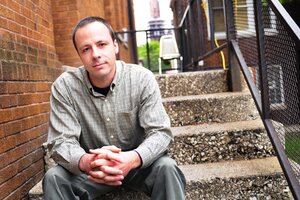Miscommunication can have serious consequences in any situation, but in a healthcare setting it can become a matter of life or death.
That’s why Matthew Ginsberg-Jaeckle (MA, ’15, translation and interpreting studies) is working to improve the way medical interpreters are trained to give every patient a voice, regardless of barriers.
“Interpreters are not just a box, where one language goes in, and another comes out," said Ginsberg-Jaeckle. "We have to do a lot more than just throw an interpreter into a room and tell them to repeat what the clinician said.”
He said it all started when he was asked to teach a health interpreting class for a Chicago-based interpreting agency. In doing so, he realized how little evidence-based work there is in the field of medical interpreting and how limited the scope of traditional training is. His own work as an interpreter only reinforced that idea.
"I knew that nothing in either my training or the training I had been providing for other interpreters could address the complexity of what you end up dealing with in real settings,” said Ginsberg-Jaeckle. “There’s so much more to communication than just the content of the words that are being spoken. There’s the role of body language and rapport in helping patients feel trust in their providers and helping them to feel like they’re part of the treatment process.”
Those experiences inspired Ginsberg-Jaeckle to look for avenues to explore some of his questions. That search landed him at the translation and interpreting studies program at the University of Illinois.
“I was given access to a world of saying, ‘This is much more complex than you might think it is, and you’re valid in questioning the assumptions of the profession. Here are some other people who are also doing that, and here are some of the questions they’re exploring,” he said.
Fast forward to today, and Ginsberg-Jaeckle is the director of Global Patient Services at the Shirley Ryan AbilityLab in Chicago. The Shirley Ryan AbilityLab is a rehabilitation hospital whose focus is on integrating research into the clinical environment and creating opportunities for staff members to participate, with the goal of using research and science to address the pressing problems that affect patients.
His own research is a great example of that. He’s working to help patients with a communication disorder called aphasia, which can result from a brain injury or stroke. He received funding from a private grantmaking institution called the Coleman Foundation to research how medical interpreters can improve the assessment of non-English speaking patients who have aphasia by shifting the role of the interpreter.
“[We looked at] what it would mean to go beyond the narrow, black and white view of the job, where interpreters are told their job is to be objective,” said Ginsberg-Jaeckle. “One scholar whose work I read at UIUC, Claudia Angelelli, has done extensive work that shows there is no such thing as an interpreter being invisible. You are visible and an actual participant in this encounter by the nature of what you’re doing. So with this study, we asked what happens if rather than saying be invisible, be objective, be black and white, we say you are visible, you are subjective, there is gray area. Let’s prepare you to navigate that.”
They tested the idea with two groups of interpreters. One group received additional training, co-developed by Ginsberg-Jaeckle and Dr. Edie Babbitt (BS, '90, speech and hearing science) a research speech-language pathologist and assistant research professor who manages the Intensive Aphasia Program of the Shirley Ryan AbilityLab’s Center for Aphasia Research and Treatment, while the other group received no additional training.
They found that by training interpreters to assume a different role than is traditionally assigned to them, they were able to reduce the number of errors that were made.
“Just as you wouldn't throw a surgical nurse into a rehab setting without training, just as you wouldn't take a neurologist and ask them to diagnose a gastrointestinal problem, just as you wouldn't take a physical therapist and ask them to assess speech, why should we assume you can throw an interpreter into any area of healthcare and assure there's going to be effective communication that meets the needs of that patient and that clinician?”
He said it was a gut sense that drove him to help, a feeling that they weren’t doing enough for non-English speaking patients in most areas of healthcare.
“You're literally being their voice in healthcare settings, which are some of our most vulnerable moments,” he said. “You're the voice of that person who's deciding whether they can go forward with an amputation or not, or who's struggling to regain speech after a brain injury, or who's figuring out whether or not to make a tough decision that could cost their life, or even just in the routine areas, who's worried about symptoms that they're experiencing.”
Ginsberg-Jaeckle’s research has already been published in the American Journal of Speech-Language Pathology, and another paper is in the works. While he said this is a good start, he also wants to see practical applications come out of this, and he hopes his work can help improve interpreting practices and patient outcomes in other clinical areas, too.
“While our research is one specific and narrow area of clinical practice, in conjunction with others that are doing similar projects, I think it can make a broader impact,” he said. “I think the work that healthcare interpreters do is underappreciated, underdeveloped, under-resourced and under-researched. I want this to contribute towards resolving all of those areas.”
Dania De La Hoya Rojas
